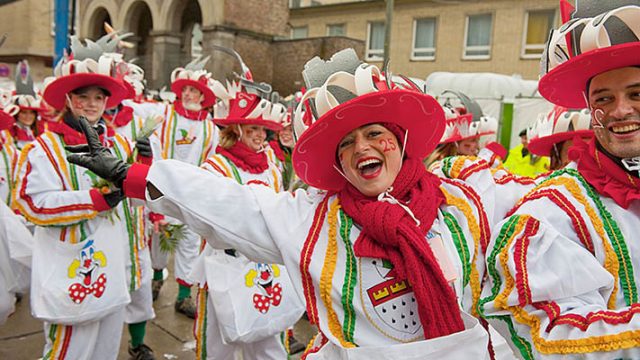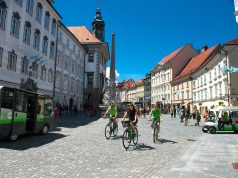
Carnival Celebrations in Germany: Here’s how it’s done
Germans celebrate carnival in late winter. Depending on the region, carnival is also called “Fasching”. Both terms have their tradition in the exorcism of winter. People in elaborate costumes dance their way through the city.
Cologne
The people of Cologne have a reputation for being fun and sociable, and they really get crazy during carnival time: 1.5 million visitors have been counted at a Shrove Monday parade making it the largest and oldest parade in all of Germany. The procession includes costumed pedestrian troupes, marching bands and people on horseback, all ready to party!
Aachen
“Oche Alaaf”, is what the people of Aachen shout at their carnival events. This small town in North Rhine-Westphalia attracts up to 300,000 visitors during the fifth season, and its inhabitants are known to celebrate carnival extensively and in accordance with the Rhenish carnival tradition.
Düsseldorf
Carnival in Düsseldorf begins when the “Hoppeditz” awakens. The Hoppeditz is a jester figure played by a well-known carnival performer. On Ash Wednesday, the jester figure is cremated in the form of a puppet in the garden of the Düsseldorf City Museum amid great lamentation, and symbolically laid to rest. The Shrove Monday procession is the second largest in Germany with one million visitors.
Nuremberg
Nuremberg is definitely not a carnival hotspot like Cologne or Düsseldorf – at least that is how the people of Nuremberg see it. However, the statistics tell a different story: the city attracts 100,000 visitors on Carnival Sunday. To ensure that the little ones also have a great time, there is a children’s carnival procession on Shrove Monday.
Mainz
At the “Mainzer Fastnacht” the silly ceremonial laws are read out aloud from the balcony of the Osteiner Hof and thousands of jesters celebrate this inaugural event every year on November 11 at 11:11 am. However, the highlight of the carnival is and remains Rose Monday. All of Mainz and its visitors are on their feet, transforming the city center into a colorful sea of jesters and fools.
Würzburg
Carnival is also celebrated in the Bavarian city of Würzburg: Each year, around 70,000 visitors sing, dance and march in the street procession. In addition to the children’s masquerade procession on the Saturday before the carnival weekend, two other processions pass through the city on Sunday and Tuesday.
Marne
Marne is one of the few northern German towns where carnival has been celebrated on a large scale since 1978. About 30 vehicles and pedestrian groups take part in the parade, and a total of about 20,000 visitors watch the spectacle every year. About four tons of sweets are thrown during this event for the ultimate sugar rush.





